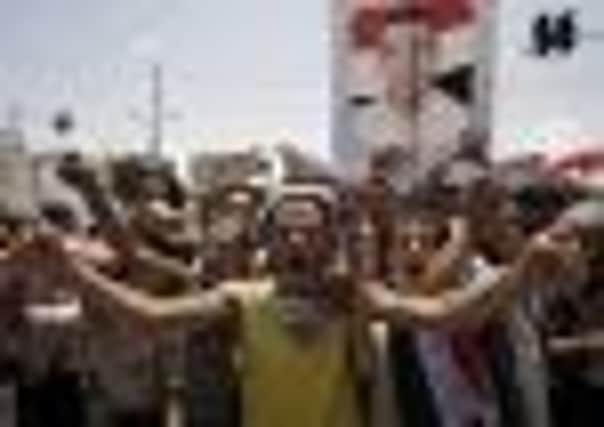Yemeni forces slaughter 40 protesters as president’s return raises fear of civ il war


Forces loyal to Yemen’s president, Ali Abdullah Saleh, who returned to the country on Friday after a three-month absence, attacked renegade troops with mortar shells, firing anti-aircraft guns and rocket-propelled grenades down city streets.
From above, snipers methodically fired at panicked protesters running for shelter. The shelling wrecked several houses.
Advertisement
Hide AdAdvertisement
Hide AdSaleh, who has clung to power despite nearly eight months of protests and an assassination attempt that forced him to get emergency medical treatment in Saudi Arabia, returned to Yemen on Friday and his presence has escalated the violence.
At least 40 protesters and one of the soldiers guarding them have been killed since early yesterday, while a further 54 have been wounded. The intensity of the fighting forced ambulance crews to leave many of the bodies in the streets.
“More bodies and injured are pouring into the hospital,” said Mohammed al-Qabati, a medical worker.
Early yesterday, troops loyal to Saleh tried to storm the protesters’ encampment on Change Square, which has been the focus of Yemen’s uprising and daily sit-ins by people demanding Saleh step down.
Around 16 protesters were killed during the attack.
In the north-west of the capital mortar shells rained down on the headquarters of the renegade troops of the 1st Armoured Division, led by Saleh’s former ally Major General Ali Mohsen al-Ahmar, who months ago sided with the opposition.
Eleven of al-Ahmar’s troops were killed in the shelling and 112 were wounded.
On a third front, Saleh’s troops fought anti-government tribesmen in the capital’s Hassaba district.
Clashes there over the past two days between government forces and opposition tribesmen resulted in the death of 18 tribal fighters, according to a statement yesterday from tribal elders.
Advertisement
Hide AdAdvertisement
Hide AdHassaba is home to Yemen’s most powerful tribal confederation, the Hashid, led by Sheik Sadeq al-Ahmar, another Saleh foe. Eight government troops were also killed and dozens wounded, said interior minister General Mouthar al-Masri.
He did not specify when or where the casualties occurred.
Yemen’s turmoil is of deep concern to the West because the country is a haven for Islamic militants, including a branch of al-Qaeda that the US claims is the most dangerous remnant of the terror network that plotted the 9/11 atrocities.
Al-Qaeda in the Arabian Peninsula has launched several nearly successful attacks on the US, including the failed plot to blow up a Detroit-bound airliner in December 2009 with explosives sewn into the underwear of a would-be suicide bomber.
With the country spiralling deeper into disorder, al-Qaeda-linked militants have already seized control of entire towns in southern Yemen beyond their traditional strongholds.
Opposition spokesman Mohammed al-Sabri held Saleh directly responsible for the latest slaughter.
He said: “It’s as if he was unleashed from a cage and came out to retaliate. This man deals with Yemen as if he’s a gang leader, not a leader of a nation.”
In another sign that Saleh is trying to cement his authority after returning from nearly three months of medical treatment, the autocratic leader is pressuring his vice-president to leave the country, and some of the government shelling even targeted an area near his house, government officials said.
Speaking on condition of anonymity because of the sensitivity of the matter, they said vice president Abed Rabbo Mansour Hadi was very disappointed with the renewed violence.
Advertisement
Hide AdAdvertisement
Hide AdDuring Saleh’s absence, Hadi was officially in charge of Yemen’s day-to-day affairs and led negotiations for a peaceful resolution to the crisis with key government opponents.
But Saleh used his powerful son Ahmed, who controls the elite Republican Guard forces, to remain in ultimate control behind the scenes.
A deal – backed by Western governments and mediated by Yemen’s Arab neighbours – would have required Saleh to transfer his powers to the vice-president. Saleh endorsed the deal several times only to balk at signing at the last minute.
Much of yesterday’s violence centred on the neighbourhoods around Change Square.
Republican Guard troops and Central Security forces battled soldiers who defected months ago and are trying to protect the protesters in the square.
Violence also shook the southern city of Taiz, home to one of the strongest waves of anti-Saleh protests, and at least one protester was killed there.
Yemen’s uprising began in February as the unrest spreading throughout the Arab world set off largely peaceful protests in this deeply unstable corner of the Arabian Peninsula.
Saleh’s government responded with a heavy crackdown that has killed hundreds.
Advertisement
Hide AdAdvertisement
Hide AdYesterday’s deaths raise to at least 140 the number of people killed in a week of new violence in Yemen.
While Saleh, who has not appeared in public since his return, breathed life into the camp of his supporters, the power-transfer deal backed by the United States and Saudi Arabia is in limbo.
The proposal would grant Saleh – who survived a bomb attack on his palace in June which left him seriously injured – immunity from prosecution if he were to hand over power. Abdu al-Janadi, a government spokesman, said yesterday that the deal could be signed soon after the parties agree on implementation.
Still, the opposition is deeply distrustful of Saleh, and some factions now say too much blood has been spilled to let him escape justice.